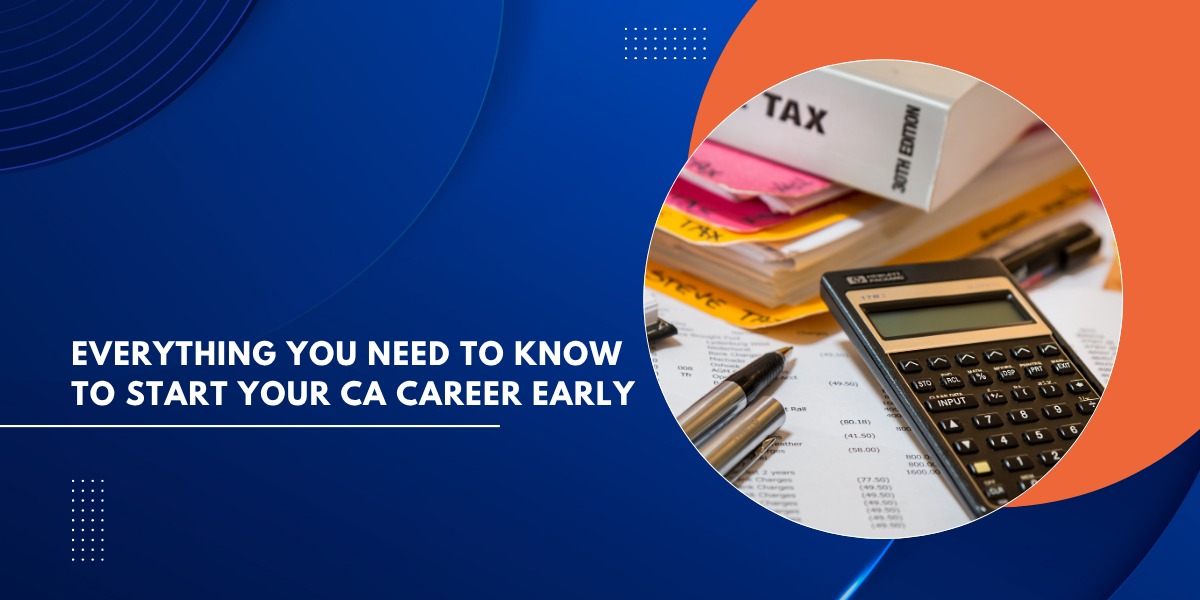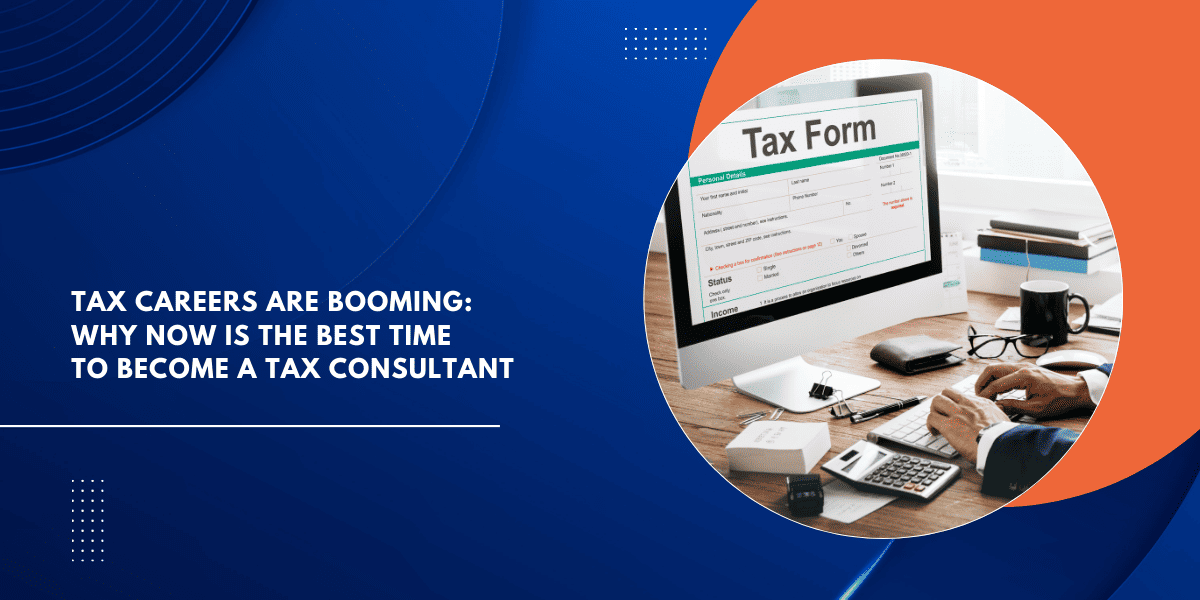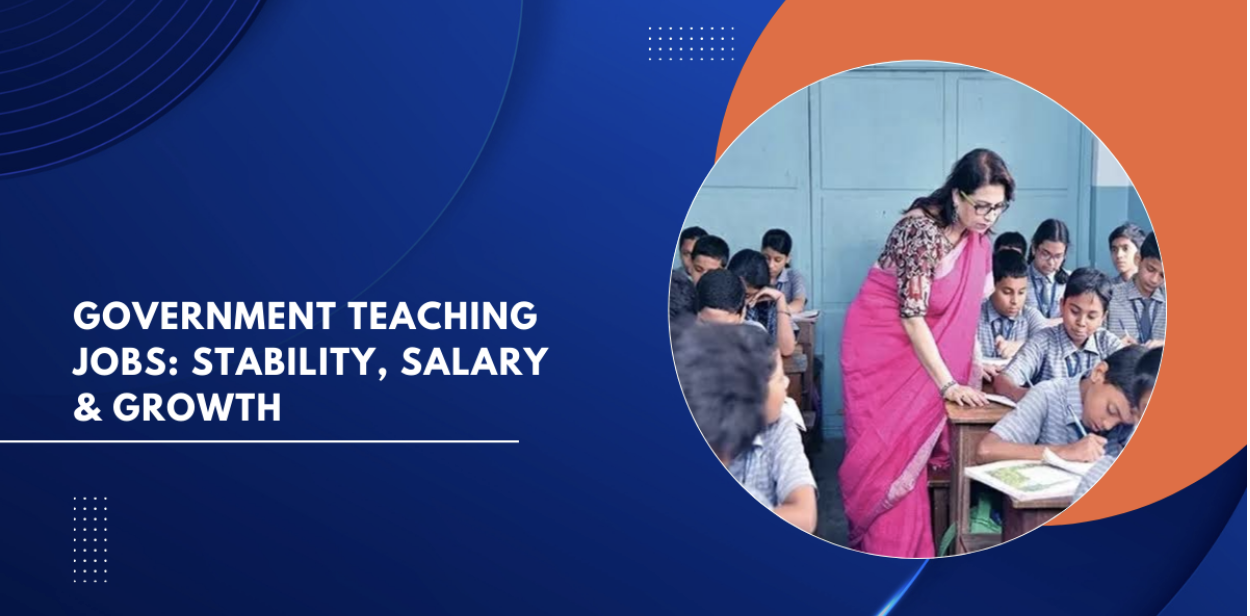Blog written by Preethi Durga, a career strategist and education innovator.
Not long ago, I was chatting with a parent whose son had just cleared his Class 10 boards. “He wants to become a CA,” she told me, “but we have no clue what the next few years should look like.”
Honestly? That’s more common than you think.
In my experience, a lot of students decide on a CA career early — sometimes even before they understand what the journey really involves. And that’s not a bad thing. The earlier you start, the better your chances of clearing the exams on time and landing great opportunities. But timing alone isn’t everything. What matters just as much is knowing how to begin.
With India’s financial sector evolving and competition for CA articleship roles intensifying, students who start early don’t just get ahead — they build deeper clarity and confidence. Early clarity is key in a rapidly shifting job market.
As a parent, you want to support your child, but figuring out what to do after Class 10 or 12 can feel like navigating in the dark. If you’re in school or have just stepped into college and are thinking of a CA career, here’s what I wish every student (and their parents) understood before jumping in.
Why Starting Your CA Career Early Can Make a Big Difference?
I’ve worked with a lot of students at different points in their CA journey — some who started late, some who jumped in early, and everything in between.
And if there’s one pattern I’ve seen again and again, it’s this: the ones who start early? They just have a different kind of momentum. Whether it’s clearing exams faster, landing stronger articleship opportunities, or simply managing the pressure better — getting a head start gives you a serious leg up.
Take Aarav, for example.
Aarav, a student from Pune, decided to start his CA Foundation prep in Class 11. By the time he entered college, he already had experience with mock tests and a clear understanding of the syllabus.
His peers, on the other hand, were just beginning to explore the material. Aarav’s early prep not only gave him an edge in exams but also boosted his confidence, making the entire journey feel more manageable.
- Clearer Exams: Starting early means you have more time to digest the material, practice, and revise. That extra time helps reduce stress when exam season comes around.
- Stronger Articleship Opportunities: By the time you’re ready for articleship, you’re not just prepared academically, but you’ve also built a network and developed the confidence to stand out in interviews.
- Managing Pressure: The earlier you start, the more accustomed you become to the rigorous schedule, helping you manage pressure better when things get tough.
As a parent, this early clarity helps reduce future stress — both emotionally and financially. Starting early can make the entire CA journey smoother for both you and your child.
1. You’re Already Moving While Others Are Still Figuring It Out
I’ve seen students who start prepping for CA Foundation while they’re still in Class 12. And no, it’s not as crazy as it sounds. These students end up developing a sharper grasp of subjects like accounts and law even before college begins.
While their classmates are still Googling “what is CA,” they’re solving mock papers. It’s less about being a genius and more about being familiar with the game before it even starts.
2. Time Management Becomes Second Nature
This one’s big. Students who begin early end up learning how to juggle stuff — classes, coaching, schoolwork, all of it. And they carry that skill throughout the CA journey.
Trust me, when articleship starts and the workload piles on, that time management muscle really pays off. You won’t be scrambling to figure out how to handle everything — you’ll already be used to it.
3. You’re Ready for the Job Market Way Before Others
Here’s something people don’t always talk about: if you clear your CA Final by 22 or 23, you’re not just done earlier — you’re free to explore better roles. Whether it’s joining the Big Four, jumping into a startup, or taking the CFO route in a few years, you’re already ahead of the curve.
Takeaway:
If CA is something you’re even thinking about, my advice is simple — start early, and start smart. You don’t have to sprint through it, but having a plan from the beginning makes everything smoother. A CA career isn’t just about clearing papers — it’s about setting yourself up for a solid, confident future while everyone else is still figuring things out.
Industry Spotlight: Where High-Paying Finance Careers Thrive
If you’re serious about a CA career, it’s not just about clearing exams — it’s also about knowing where to apply those skills once you’re qualified.
Over the years, I’ve seen students land in all sorts of finance roles — some chase adrenaline-filled jobs, others prefer structure and stability. Either way, there’s no shortage of industries where finance professionals are making serious money and building meaningful careers.
Take Nisha, for example.
Nisha cleared her CA Final by 22 and now works in Corporate Finance at Amazon. She appreciates the work-life balance and the opportunities for growth. Currently being mentored for a senior analyst role, Nisha is already seeing the potential for career advancement that comes with her early start.
At firms like Goldman Sachs, the pay can range between ₹20–25 LPA depending on the role and experience. Similarly, in private equity and venture capital, compensation can go up to ₹50 LPA with profit sharing options, especially if you move up to a partner position.
Best careers after CA qualification span across various high-paying sectors, so no matter where your interests lie, there’s a place where you can excel. Whether you’re driven by a fast-paced, high-pressure role in investment banking or prefer the stability and strategy of corporate finance, starting early helps you position yourself for these lucrative opportunities.
Let’s break it down.
1. Investment Banking: Big Deals, Bigger Paychecks
This is where finance meets strategy — and speed. Investment bankers handle mergers, acquisitions, IPOs, and complex financial models. If you’re someone who loves high-stakes pressure and fast decision-making, this might just be your arena.
Real Talk:
At firms like Goldman Sachs India, fresh analysts can start with ₹20–25 LPA. But climb the ladder to associate or VP roles? You’re looking at ₹40–80 LPA — plus bonuses. And it’s not just global firms. Indian names like Axis Capital and ICICI Securities are stepping up big time.
What I’ve Seen:
Some of my CA+MBA students have gone this route — and yeah, the hours are brutal. But the exposure? Unreal. You’re sitting in on board meetings, structuring billion-rupee deals, and building a network that can open doors for the rest of your career.
👉 If you’re someone who thrives in high-pressure zones and can think clearly even with a ticking clock — investment banking could be your sweet spot.
2. Private Equity & Venture Capital: The Big Betters
These are the people backing the next big thing — sometimes before it’s even built. PE and VC professionals spend their days analyzing startups, reading term sheets, and figuring out which bets will pay off big.
Earnings Snapshot:
At firms like Blackstone, associates earn ₹7–20 LPA approx. depending on experience. VC roles at places like Sequoia or Blume Ventures may offer slightly lower base salaries — but the real game carries interest. If your investment does well? You get a slice of the profits — sometimes worth lakhs.
What I’ve Noticed:
Students with startup experience — even short-term — tend to break into VC more easily. They understand the founder language, they’re curious, and they know what early-stage chaos feels like. It’s not a path for everyone, but if you’re wired for big ideas and big risks, this is a rewarding space.
👉 If you’re curious about entrepreneurship, enjoy strategic thinking, and want your job to feel like Shark Tank (minus the drama) — PE/VC might just be your calling.
3. Corporate Finance: Quietly Powerful — and Profitable
Not everyone wants the hustle of Wall Street-style jobs. Some of my clients say they prefer the rhythm of corporate finance — and I totally get it. You’re not just managing numbers — you’re helping shape company decisions.
What It Pays:
Finance Business Partners and Controllers at companies like Amazon, Nestlé, and Unilever can earn ₹18–25 LPA. Indian firms like Tata and Mahindra also offer strong finance career tracks — and yes, promotions come with meaningful raises.
Why It Works:
A lot of my mid-career clients in corporate roles say they value predictability. You’re still part of high-level strategy, but you also get your weekends back. And over time, you can climb toward CFO or Head of Finance roles with serious pay and authority.
👉 If you’re someone who likes stability, structure, and influencing key decisions without burning out — corporate finance is a very smart path.
There’s no one “right” industry. What matters is what suits you. The good news? A
CA career can open doors to all of these — and more. Whether you want the thrill of investment banking or the balance of a corporate finance role, your CA background gives you the credibility and capability to go after it.
And if you’re just starting out? Good. That means you’ve got time to explore, experiment, and figure out what path feels right — while still aiming for the top.
Job Market Pulse: Top Hiring Trends for Chartered Accountants
Job Market Pulse: Top Hiring Trends for Chartered Accountants
So, what does the future actually look like if you’re planning a CA career? Short answer: busy and full of opportunity.
From boardrooms to startups, finance teams are evolving fast. Today’s companies aren’t just looking for people who can crunch numbers — they want problem-solvers, tech-savvy thinkers, and people who can see the bigger picture. The demand is real, and it’s growing.
The Growth Is Real

According to the U.S. Bureau of Labor Statistics, business and finance roles are projected to grow faster than average all the way through 2033. Which means one thing: if you’re entering the finance job market in the next few years, you’re going to have options.
And not just traditional roles.
What’s in Demand Right Now?
I’ve been watching this closely — and reports like Career in the USA back it up.
Companies are actively hiring for:
- Financial Analysts
- Risk Managers
- Compliance Officers
These aren’t just job titles — they’re well-paid, high-responsibility roles. Especially if you’ve got a CA background plus strong tech or regulatory skills, you’re in a great spot.
Skill Shortage = Better Offers
Here’s the interesting part. According to ManpowerGroup’s latest Talent Shortage Survey, around 74% of employers say they are struggling to find the skilled talent they need. The survey also reveals that the global talent shortage is especially high in certain industries, with the finance and real estate sector facing a 72% talent shortage.
And that shortage? It’s forcing companies to rethink how they hire.
Just recently, a mid-size fintech in Bengaluru told us it took them four months to fill a Risk Manager role.
They had to offer:
- A 30% salary bump
- Hybrid flexibility
- And equity options
All just to seal the deal. That’s how competitive the hiring market is right now. Companies are going all out to lock in skilled finance talent — and that’s good news if you’re preparing the right way.
Key Insight: Companies today are hiring faster and paying more — but only for candidates who stand out with relevant, future-ready skills.
So… how do you break in (and stand out)?
This is where I’ve seen a lot of careers take off — not because someone had the perfect resume, but because they had the right prep, right mindset, and the right guidance. That’s exactly what we offer at NextMovez.
We don’t just give students a list of career options — we actually help them build a real path forward.
Here’s how:
✅ Personalized Career Mapping: We figure out what actually suits you — based on your strengths, interests, and goals.
✅ Access to Real Mentors: Our mentors work at firms like Deloitte, Zerodha, Axis Capital — and they share what’s actually working right now.
✅ Short-term Tactics + Long-term Vision: We don’t just prepare you for your next exam or job interview — we help you build the mindset, skillset, and strategy for a career that grows with you.
Takeaway:
I’ve seen students land roles they never thought they’d get — not because they had the perfect background, but because they had direction. That’s what we do at NextMovez. We help you cut through the noise and move forward with confidence.
If you’re serious about a CA career, now’s the time to take it seriously — because the opportunities are out there, waiting for people who are ready.
That’s exactly what we offer at NextMovez.
We don’t just give students a list of career options — we actually help them build a real path forward.
Here’s how:
✅ Personalized Career Mapping: We figure out what actually suits you — based on your strengths, interests, and goals.
✅ Access to Real Mentors: Our mentors work at firms like Deloitte, Zerodha, Axis Capital — and they share what’s actually working right now.
✅ Short-term Tactics + Long-term Vision: We don’t just prepare you for your next exam or job interview — we help you build the mindset, skillset, and strategy for a career that grows with you.
Takeaway:
I’ve seen students land roles they never thought they’d get — not because they had the perfect background, but because they had direction. That’s what we do at NextMovez. We help you cut through the noise and move forward with confidence.
If you’re serious about a CA career, now’s the time to take it seriously — because the opportunities are out there, waiting for people who are ready.
Emerging Skills for a Successful CA Career
Here’s the thing most students don’t realize early enough: just clearing your CA exams doesn’t automatically land you a high-paying role. Don’t get me wrong — the CA qualification is powerful. But if you want to stand out in interviews, get into top firms, or grow fast once you’re hired, you need more than just a degree.
Over the years, I’ve seen fresh CAs with solid skill sets jump into investment banking, fintech, and even CFO-track roles. I’ve also seen others get stuck in routine audit work simply because they didn’t upskill at the right time.
So, if you’re serious about building a successful CA career, here’s where you should be investing your time and energy.
Financial Modelling & Valuation — The Core Toolkit Beyond Your Books
Every CA student learns the theory — but can you build a 3-statement model from scratch? Can you value a company and explain your logic to a senior partner?
What You Need to Learn:
- Advanced Excel (macros, pivot tables, formulas that go beyond totals)
- Financial model building (P&L, Balance Sheet, Cash Flows)
- DCF, Comparable Company Analysis, LBO models
Where It’s Used:
At firms like Goldman Sachs or Axis Capital, CAs in analyst roles use these models every day to help drive real investment decisions.
What We Do at NextMovez:
We train students on actual case studies — not just formulas on slides, but how to apply them in high-pressure scenarios.
👉 If you’re aiming for corporate finance, equity research, or investment banking — this isn’t optional. It’s your entry ticket.
External Resources:
Data Analysis & Visualization — Because Numbers Alone Don’t Win
You’ve passed CA Final — great. But now the partner wants a summary dashboard by EOD. Can you do it?
What You Need to Learn:
- Excel and SQL for data cleanup
- Power BI / Tableau for dashboards
- A bit of Python (Pandas, Matplotlib) if you want to go deeper
- Google Sheets automation (it helps more than you’d think)
Real Use:
Finance teams at startups like Zerodha use dashboards to monitor everything — from cost tracking to user trends.
👉 You’re a CA. Now learn to speak “data” — because that’s how decisions are made today.
External Resources:
Fintech Tools & Platforms — Speak the Language of Today’s Finance Teams
Tech is everywhere in finance now. As a CA, you’ll be expected to understand how systems work — even if you’re not the one coding.
What You Need to Learn:
- Accounting platforms: Tally Prime, QuickBooks, Zoho Books
- ERP basics (especially SAP FICO)
- Understanding APIs, UPI, mobile payment flows
- Basic awareness of blockchain and digital wallets
Where It’s Used:
At companies like Paytm or Razorpay, finance teams don’t just do compliance — they handle real-time transactions and tech integrations.
👉 If you’re targeting fintechs or startup finance roles, this fluency sets you apart from traditional profiles.
External Resources:
Financial Regulations & ESG — Yes, These “Boring” Topics Pay Well
Let’s be honest — most CA students zone out when it comes to regulations or ESG. But that’s exactly where the big hiring is happening right now.
What You Need to Learn:
- SEBI, RBI, IRDA regulations
- Global tax basics: DTAA, FATCA, GAAR
- ESG frameworks and sustainable finance
- AML, KYC, audit prep protocols
Where It’s Hot:
Firms like Deloitte and EY are building entire verticals around ESG and regulatory compliance — and they need smart CAs who get it.
👉 If you’re someone who actually enjoys structured frameworks and risk management — this could be your niche.
External Resources:
Communication & Strategic Thinking — What Sets You Apart in a Room Full of CAs
I’ve seen fresh CAs freeze in front of clients — not because they lacked knowledge, but because they couldn’t explain their point clearly.
What You Need to Learn:
- How to write professional emails and reports
- How to present a budget or audit findings clearly
- Confidence in meetings — especially with non-finance teams
- Strategic thinking: looking at ROI, not just entries

Example:
At early-stage startups, CFOs often have to explain numbers to investors who don’t care about journal entries — they want business impact.
👉 Your technical skill gets you hired. Your ability to communicate is what gets you promoted.
Parents — if your child is preparing for a CA future, now is the time to look beyond the books. These skillsets will not only improve employability, but also confidence in real-world finance conversations.
Key Takeaway:
Want to Learn These Skills Practically?
Join our skill-building workshops designed for CA aspirants. Talk to a mentor today!
Future Outlook for CA Careers: What’s Changing — and What to Expect Next
If you’re working toward a CA career, here’s something I want you to remember — the finance world is changing faster than ever, and the opportunities for Chartered Accountants are only getting broader, deeper, and more global.
According to the U.S. Bureau of Labor Statistics, finance and business roles are projected to grow by 7% between 2023 and 2033, which is faster than the average for all occupations. And in India, the Institute of Chartered Accountants of India (ICAI) estimates that the demand for qualified CAs is growing at 12–15% annually — particularly in areas beyond traditional audit and tax.
So, what does that mean for you or your child, if you’re looking to enter the field? Let’s break it down.
CAs Beyond Traditional Roles
A decade ago, most fresh CAs stuck to statutory audit, tax filing, or internal audit roles. Today, things look very different. Companies are hiring CAs in roles that require strategic insight, not just compliance.
Emerging Roles Include:
- Business controllers and FP&A specialists
- Financial strategists and corporate advisors
- Data-backed CFOs who blend numbers with decision-making
💡 What This Means for You:If your child gains strategic financial insight alongside traditional skills, they’ll stand out in interviews and land roles that didn’t even exist 10 years ago. These new roles offer exciting challenges and higher pay than the more traditional audit positions.
Tech-Ready CAs Will Lead
Automation is already reducing the need for manual accounting and reconciliation tasks. But it’s also increasing the demand for CAs who understand how technology impacts financial systems.
A McKinsey report suggests that 40% of basic accounting work could be automated by 2030, which means your edge will come from strategic thinking, not number-crunching alone.
Upskilled CAs who are familiar with tools like:
- Power BI, SAP FICO, and cloud accounting software
- Financial data analytics (SQL, Excel automation)
- AI-driven forecasting tools
💡 What This Means for You:
Your child won’t just be preparing for a standard CA role; they’ll be ready for the future of finance. These tech-savvy skills will make them indispensable as the industry evolves — and they’ll be able to step into roles faster, with higher pay.
ESG: The Next Big Career Track
Sustainability-focused investing is no longer a niche. Globally, ESG-related assets are expected to reach $50 trillion by 2025, according to Bloomberg.
That means companies will need CAs who understand:
- ESG reporting frameworks (like BRSR and GRI)
- Impact measurement
- Sustainability-linked audit and compliance
💡 What This Means for You:
If your child gains ESG and reporting skills now, they’ll be in demand for roles that didn’t exist even five years ago — with salaries that reward foresight. These positions are high-paying, strategic, and key to the future of finance.
Freelance & Global Careers Rising
Thanks to the rise of virtual work, many Indian CAs are now working remotely for firms in the UAE, UK, Singapore, and even the U.S.
This trend is being driven by a shortage of finance talent globally — especially in mid-senior roles.
According to a Deloitte survey, nearly 70% of CFOs in global firms say they’re struggling to hire experienced finance talent.
What This Means for You:
- Freelance CFO and virtual controller roles are on the rise
- Indian CAs with international exposure (IFRS, US GAAP, etc.) can charge premium rates
- Work-from-anywhere finance careers are very real — especially if you focus on building the right mix of regulation + technology + strategy
💡 What This Means for You:
If your child is preparing for a CA career, it’s time to think beyond local opportunities. With international exposure and remote work growing, they’ll be in a position to command global roles and higher compensation.
Micro-Scenario:
Take Shivani, for example.
Shivani, a CA from Coimbatore, works remotely for a UAE-based blockchain startup — managing smart contract audits and helping with cross-border compliance. None of this existed when she started college — but her readiness to adapt gave her an edge. She’s now in a high-paying role, working globally from the comfort of her home.
Strategic Planning for Tomorrow’s CA Career
Don’t prepare your child for yesterday’s CA career. Let’s explore what fits them today — and positions them for tomorrow.
In Conclusion
A CA career today is no longer a one-track journey. The industry is evolving. The jobs are diversifying. And the demand for forward-thinking, tech-ready, globally aware finance professionals is only going to grow.
If your child is serious about finance — don’t let them rely on guesswork. Let’s understand their strengths, map a practical pathway, and give them a real head-start — not just in exams, but in life.
As a parent, this is your chance to guide — not decide — your child’s career journey. With clarity, they’ll lead with confidence.
No pressure to commit — this first call is just to explore what truly fits your child’s goals, strengths, and pace.
Ready to help your child build a future-proof CA career?
Hundreds of parents have used our career clarity sessions to help their teens choose finance paths that truly match their personality, pace, and potential.






















